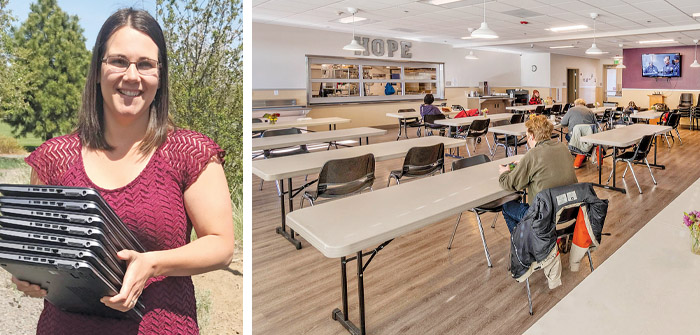(Left: During the pandemic, Big Brothers Big Sisters of Central Oregon has helped supply the needs of participating families, including providing laptops. Pictured is Elysia Kiyija, BBBSCO’s program manager | Photo courtesy of J Bar J and BBBSCO. Right: At the Bethlehem Inn, social distancing, mask-wearing and sanitation protocols are in full force | Photo courtesy of the Bethlehem Inn)
In navigating the early days of the pandemic, most nonprofit agencies had to rethink their methods practically overnight, changing their priorities and learning how to function almost completely virtually. Since then, staff and volunteers have settled into new routines and rhythms and have created revised protocols in order to function in this new world.
“At United Way of Central Oregon, we operated completely remotely for several months, but are now operating in a hybrid model, with staff spending some time in the office and some time working from home,” says Executive Director Ken Wilhelm. “All of our meetings are now conducted via Zoom or a similar platform. We wear masks when we are in the office, and are no longer available for walk-ins. We’ve cancelled all of our in-person events for the foreseeable future.” He adds, “The nonprofits that provide direct assistance to people have had to adapt the most.”
Bridget Albert, community outreach coordinator of Big Brothers Big Sisters of Central Oregon (BBBSCO), says that for 26 years, the role of BBBSCO has been to match local youth with caring adult mentors, but during this time, assisting the families of the children has become their top priority. “Through funding provided by Central Oregon Latino Partnership Program, BBBSCO distributed Visa, Safeway and Grocery Outlet gift cards to our Latinx families, positively impacting 73 people throughout Deschutes, Jefferson and Crook counties,” she says. The organization also distributed ten laptops to Latinx Mentoring Program mentees to enable them to graduate high school and apply to secondary education and scholarship opportunities; has delivered food boxes to Latinx Mentoring Program families; assisted the parent of a mentee with an unemployment application and helped find child care for another family. “COVID-19 safety information and comprehensive distance learning information was distributed to our LMP families in Spanish via e-mail. Our reach went beyond our Latinx families. We provided food, civil masks donated by Blackstrap Industries, computers donated by G5, Lego sets donated by Avion Water Company and so much more to any family who needed assistance, positively impacting more than 200 people.”
Summer camps also looked different for BBBSCO, Albert says. “Trinity Episcopal Church of Bend sends 20 to 30 BBBSCO kids to a week-long summer camp for free. “For the majority of our Littles, this is their only camp experience. Due to COVID-19, summer camp was cancelled, but the congregation continued to raise money to provide our Littles with enrichment and outdoor activities. These activities included online classes, martial arts, horseback riding and gymnastics lessons, kayak rentals and educational activity boxes.”
LOFT Program Manager Maggie Wells says much has changed since last year with her organization’s operations as well. “We are not taking donations, and we do not have drop-in services for street outreach youth. We have to refer out now for youth to take showers, do laundry and cook hot meals.” She said the street outreach team still goes out to meet with youth on the streets to provide basic needs as much as possible, but they have not been able to take in as many youths as they would like. She adds, “Recreation in the community has to be done in the building, since youth are not able to engage in pro-social activities. Staff members are having a hard time keeping youth engaged and sane from having to be in the building more.” Medical protocols have also increased, she says, due to temperatures and symptom assessments having to be taken. “Mental health and appointments are all through tele-medicine now.”
At Bethlehem Inn, the one thing that has not changed, according to Executive Director Gwenn Wysling, is the safety and security of everyone at shelter. “Last spring, staff quickly revised policies to implement CDC guidelines for our residents, ensuring the sleeping quarters and dining room areas are meeting safety standards. These changes also included mandatory use of masks and social distancing. The biggest change for us is the temporary suspension of our volunteer program. As an organization that started with a volunteer force, their support is deeply missed.”
At Younity, co-founder and president Arlene Gibson said that because their programs have transferred to virtual and online since March, the biggest change for her organization is that it has become more national in scope. “Now that we are online, we can actually reach more people. We can reach people in different parts of the country; we’d never thought to do that before,” she says. Because parents, teachers and students are so overwhelmed, Gibson says Younity’s peace initiative, inspiration day and kindness programs are needed now more than ever before, as are the Question Persuade Refer (QPR) suicide-prevention programs.
Over at Partners in Care, Chief Development Officer Marlene Carlson says the use of technology to conduct meetings has been in place since early March, which is a big change for them. “Community education programs, palliative care consultations, grief support groups and job interviews have all utilized virtual meeting technology.”
unitedwaycentraloregon.org • bbbsco.org • cascadeyouthandfamilycenter.org • bethleheminn.org • younityus.org • partnersbend.org




